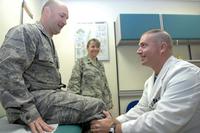After weeks of bickering over a provision dealing with detaining terrorism suspects, Congress finally sent the National Defense Authorization Act of 2012 to President Barack Obama for signature. According to reports the President is no longer threatening to veto the bill. This should finally end any concern over the proposed 2012 across the board military pay increase.
Many now feel the arguements over the section on the handling of detainees were largely based on misstatements. According to Politico, Senate Armed Services Committee Chairman, Carl Levin (D-MI) said, “Neither the Senate bill nor the conference report establishes new authority to detain American citizens – or anybody else.”
Although the proposed amount of the raise (1.6 percent) was never contested between the Senate and House versions of the bill, the battle over the detainee issue could have delayed the raise, which is now set to go into effect in January.
Servicemembers can also breathe a little easier this week knowing the House passed a “massive” spending bill that will fund the government until next October. This means we may be able to make it through the most of 2012 without the recurring threat to shut-down the government. Of course military pay isn’t completely out of the woods just yet; the DoD is continuing to search for ways to meet the budget reductions demanded by the pending “sequestration.”
Other NDAA Provisions of Interest
TRICARE Prime Enrollment Fees: The NDAA includes a provision (Title VII, Sect 701) which will increase TRICARE Prime enrollment fees for military retirees by the same percentage as the annual retiree Cost-of-living-Adjustment (COLA). This is not big surprise to most and many see this as a fair way to meet the increasing cost of health care. It is a lot easier to take than Sen. McCain’s suggestion to take the benefit away from retirees all together.
Special Pay: The act also locks in the current special pay amounts at current levels. This covers everything from flight pay to career sea pay.
National Guard: The NDAA will also change the makeup of the Joint Chiefs of Staff, making the head of the National Guard Bureau a member of the JCS. Many feel it is about time considering the Guard’s role in Iraq and Afghanistan.
According to reports, the Guard’s current top officer, Air Force Gen. Craig McKinley, will likely be first Guardsman to sit on the Joint Chiefs if the President does in fact sign the bill.
Stay tuned -- More to follow, once the final version of the bill is posted.



